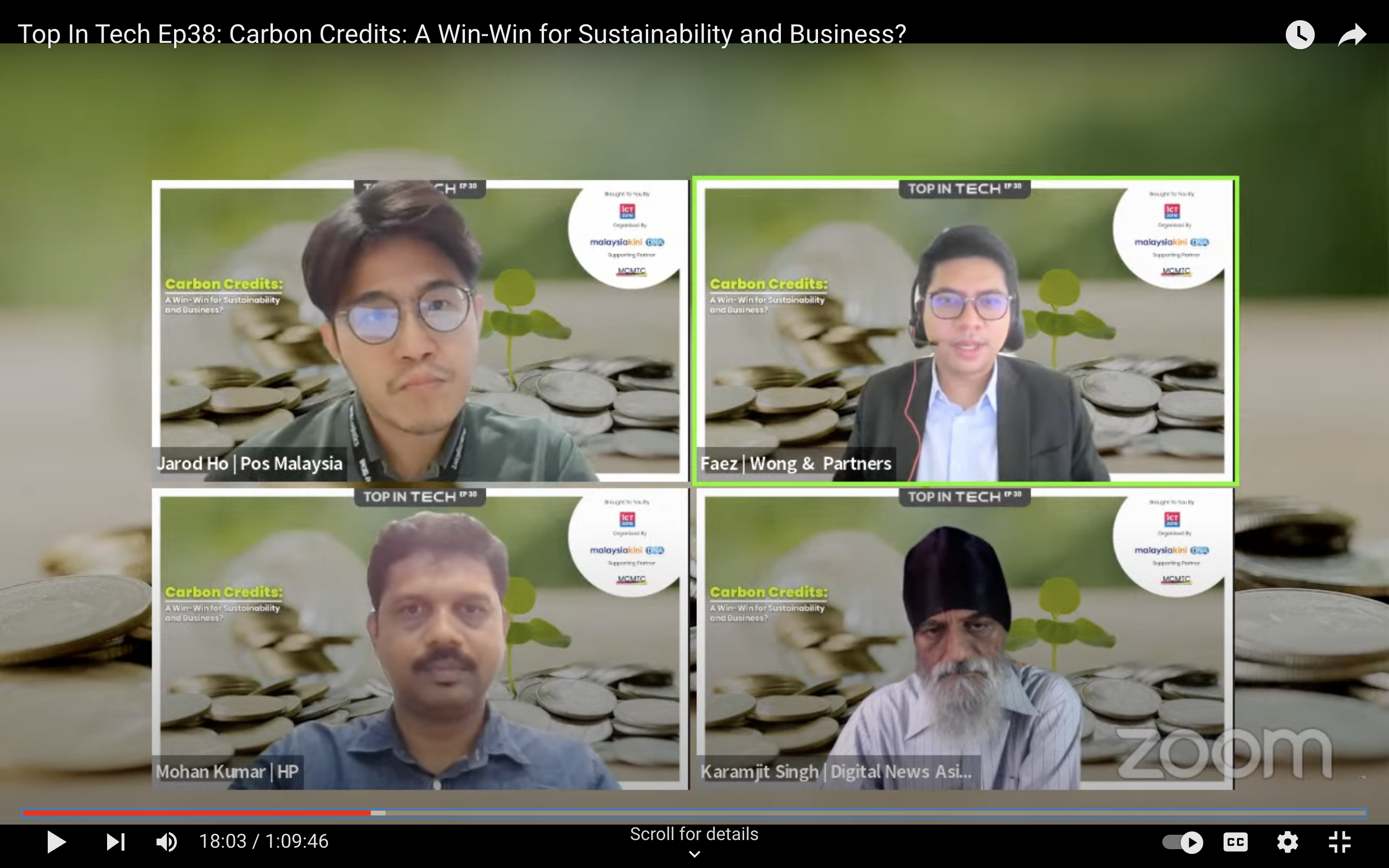The 12th Malaysia Plan (12MP) was introduced as a response to the economic fallout caused by the COVID-19 pandemic and outlined a strategy for fostering five years of prosperous, inclusive, and sustainable growth in Malaysia. Therefore, a Parliamentary session has been scheduled from September 11th to 19th to conduct a Mid-Term Review of the 12MP. This review aims to comprehensively assess the progress made, identify challenges, and make necessary adjustments as required.
In this episode, Karamjit Singh, CEO of Digital News Asia moderated the session by talking about the undeniable significance of carbon credits and cutting-edge storage solutions as industries in Malaysia pursue measures to combat the far-reaching effects of climate change and unravel the landscape of carbon credits by delving into their current market acceptance and adoption
The discussion commenced with insights from Faiz Abdul Razak, Partner in Finance & Projects at Wong & Partners, shedding light on key factors in Malaysia's climate change battle. He emphasized the significance of carbon credits as a crucial element, along with the environmental aspects of ESG (Environmental, Social, and Governance) and the utilization of innovative storage solutions; “Carbon credits, in essence, act as a kind of environmental currency that grants companies the ability to offset their pollution by investing in eco-friendly initiatives”. In the quest for a win-win scenario, the reduction of greenhouse gas emissions is crucial, and carbon credits play a pivotal role in achieving this. Karamjit added by noting the evolution from the early days of "carbon capture," where obtaining carbon credits was a primary focus, to the current state of affairs, marked by progress and innovation in the field.
Carbon Credit Adoption and Market Acceptance in Malaysia: Challenges and Opportunities
Mohan Kumar D, Head of Workforce Services and Solutions for Greater Asia at HP Inc, shared his perspective on the current state of market acceptance and adoption of carbon credits in Malaysia. He noted that an increasing number of companies, including HP Inc are recognizing the value of carbon credits as a valuable tool to counterbalance their carbon emissions. The Malaysian government's efforts to promote carbon credit projects have also contributed to their growing acceptance within the business community.
Nevertheless, Mohan emphasized that there remains room for improvement. He believes that more extensive education and awareness campaigns are essential to help businesses grasp the full range of benefits associated with carbon credits; “Beyond emission reduction, these credits represent a potential revenue stream”. Moreover, Mohan stressed the importance of further developing regulatory frameworks to create a clear and supportive environment for carbon credit projects, fostering their broader adoption and impact
The session continued with insights from Jarod Ho, Head of Sustainability at Pos Malaysia, highlighting the growing significance of carbon credits within the logistics and shipping sector. As companies in this industry strive to reduce their carbon footprint, many, including Pos Malaysia, are actively exploring avenues to offset their emissions through carbon credits, particularly in the context of hard-to-abate sectors. Notably, the rising environmental consciousness among consumers adds a compelling dimension to this approach. “Using carbon credits as a means to mitigate emissions has the potential to serve as a selling point for businesses, bolstering brand image and fostering customer loyalty”. However, logistics companies face unique challenges in quantifying and reducing emissions due to the nature of their operations, making carbon credits an invaluable tool in achieving their sustainability goals.

Legal and Financial Aspects of Carbon Credits in the Malaysian Business and Legal Communities
The discussion then turned to the legal and financial aspects of carbon credits and their reception within the Malaysian business and legal communities. According to Faiz Abdul Razak, carbon credits have gained considerable attention in these circles. On the legal front, there's a growing recognition of the importance of robust contractual agreements to govern carbon credit transactions. Companies are becoming increasingly vigilant about safeguarding their interests in these dealings and ensuring compliance with international standards.
Financially, carbon credits are viewed as an innovative means to not only promote sustainability but also generate revenue. This has piqued the interest of investors looking to support carbon credit projects. However, challenges persist, particularly in terms of providing access to finance for smaller enterprises and startups, hindering their participation in this field which is supported by Mohan.
In general, the perception within the Malaysian business and legal communities is largely positive, yet there's a recognition that further development of the ecosystem is needed to streamline transactions and foster broader adoption.
Utilizing Carbon Credits for Business Sustainability
In response to the final question about whether business activities can utilize carbon credits, Faiz emphasized that since emissions are measured on a company basis rather than an activity basis, businesses have the opportunity to engage in carbon credit initiatives. He pointed out that while many SMEs may not currently qualify, the government's focus tends to be on larger players who have a significant financial impact, but he believed that this dynamic would eventually evolve to include a broader range of businesses. He suggested that collaborating with partners to develop carbon projects could be a viable strategy.
Karamjit added to the conversation by offering an example applicable to universities. He suggested that these institutions could reduce their carbon footprint by constructing student housing on campus, aligning with the ESG (Environmental, Social, and Governance) agenda discussed earlier by Jarod Ho.
Jarod highlighted the relationship between renewable energy credits and carbon credits, emphasizing that renewable energy credits effectively render the power generated by producers as "clean." Certificates are then produced, referred to as carbon credits, which allow certified entities to claim their use of green energy. “This serves as a valuable tool for businesses and organizations aiming to demonstrate their commitment to sustainability and environmentally friendly practices”
Watch Top In Tech Ep38: Carbon Credits: A Win-Win for Sustainability and Business? - HERE
This article is provided by Kini Events

